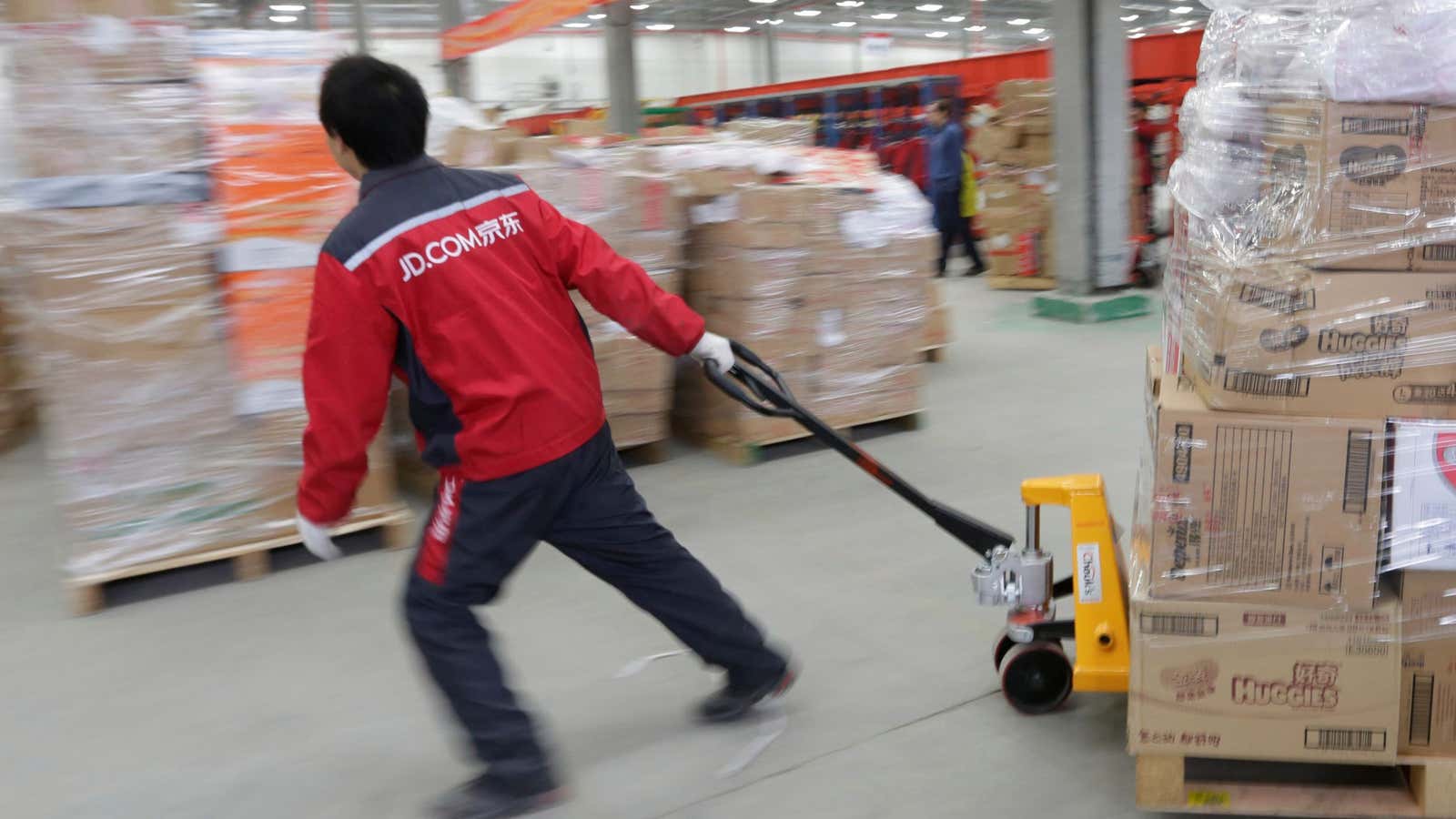Of the many companies trying to adapt to China’s slowing economy, logistics and e-commerce giant JD.com has put itself under the spotlight for its messaging about the workers it wants to retain—and those it doesn’t.
Over the weekend, an email reportedly sent (link in Chinese) to its department that oversees customer service workers specified three kinds of underperforming employees it’s putting on notice. These included staff who don’t keep “fighting” to do more work “regardless of performance, position, tenure, personal well-being issues or family reasons.”; those with poor performance; and those whose pay was disproportionate to performance. Overpaid people should make way for “younger people with lower costs,” or they can choose to downgrade and take a lower salary, said the email, which was posted on Maimai, a Chinese LinkedIn-like platform.
The story, first reported by news outlet China Fund News, prompted fierce discussions in online forums in China where stressed Chinese tech workers are sharing news and rumors of layoffs and changes to salary and benefits, and protesting the industry’s “996” work culture of working 9am to 9pm, six days a week.
“In short, [JD] is turning unmarried youth into dry old fried fritters until no oil and water can be drained out of them. Then turn to a new batch of fried fritters,” a user commented (link in Chinese) on microblog Weibo.
JD hasn’t said how many layoffs it’s planning, but on April 9 the Information (paywall) reported that the company could cut more than 12,000 jobs (paywall), or 8% of its roughly 150,000 workforce. JD said the figure was inaccurate and told Quartz it plans to hire 1,300 college graduates this year, in addition to plans to hire thousands of logistics workers.
Working long hours without overtime has been the norm for coders and project managers, even though labor contracts spell otherwise. The famed 996 schedule helped build China’s booming tech industry. But just as tech giants look set to become even more demanding, workers are voicing more opposition to China’s tech culture.
Last month a new “996.ICU” repository on Github (link in Chinese) listed Chinese labor rules on work hours and named tech firms that violate them—the ICU in its name refers to where overworked workers will eventually end up. Anonymous workers from nearly 90 companies posted about how much they worked in the name of “flexible working hours.” JD, along with other tech majors like Tencent, Alibaba, and its affiliate Ant Financial, appeared on the list.
JD responded on Maimai over the weekend that the layoffs email should be seen in the larger context of how it treats workers and listed a slew of benefits the firm gives employees including health insurance and education for children. “For now, we encourage the startup and fighting spirit… we would like to create an environment that relies on a fair, hardworking environment instead of dawdling day after day using excuses. In this way, we can be responsible for our employees,” it said.
“While we can’t comment on internal matters, but what we can say is that JD.com is a competitive workplace that rewards initiative and hard work, which is consistent with our entrepreneurial roots. We’re getting back to those roots as we seek, develop and reward staff who share the same hunger and values,” a JD representative told Quartz.
Posts with the hashtag #JD responds to getting rid of three kinds of people (#京东回应淘汰三类人#) have garnered nearly 20 million views on microblog Weibo (link in Chinese).
Some, defending JD, have said a company can’t behave like a charity organization. But others were uncomfortable with the idea of letting go of workers who are trying to balance their working hours with family obligations—an issue of particular relevance as China tries to encourage women to have more children.
“It’s true that companies won’t tolerate slackers. But what’s the definition of fighting? What does it mean not to fight because of well-being and family reasons? Don’t you get sick? Don’t you have any family?” read a comment which gained more than 3,000 likes (link in Chinese).
“Is it another way to ask for overwork by relating not fighting hard with family and personal issues?” another wrote (link in Chinese). “This is being indifferent to employees’ family happiness and personal health.”
The internal communication about layoffs comes after JD last month asked employees to make “full contributions” by working 12 hours a day at least five days a week. That’s still 16 hours longer than what China’s labor law dictates—a 44-hour workweek (link in Chinese). It’s unclear if workers are compensated with extra pay.
JD also said this year would let go 10% of its senior executives—in recent weeks, three top executives have announced they will resign.
JD earlier told Quartz it was not laying off workers but “optimizing” them, and that it plans to bring in 15,000 new workers this year, two-thirds of whom will be logistics staff. On Monday (April 7), China Fund News also reported that JD is changing how it pays (link in Chinese) for couriers by essentially taking their base salary away, and instead using commission-based compensation.
“996.ICU is not enough. It’s best if you are single,” wrote a user on (link in Chinese) microblog Weibo.
Update: This post was updated on April 10 with an estimate for the number of layoffs JD is planning, and with comment from JD on that report.
